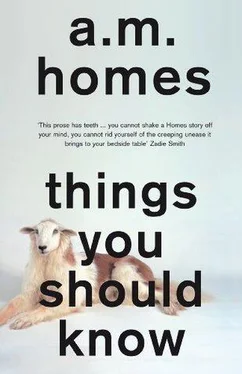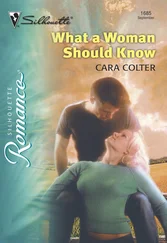“I have never been so unhappy in my life,” my wife says when we’re near the top. “It’s not just the cancer, I was unhappy before the cancer. We were having a very hard time. We don’t get along, we’re a bad match. Do you agree?”
“Yes,” I say. “We’re a really bad match, but we’re such a good bad match it seems impossible to let it go.”
“We’re stuck,” she says.
“You bet,” I say.
“No. I mean the ride, the ride isn’t moving.”
“It’s not stuck, it’s just stopped. It stops along the way.”
She begins to cry. “It’s all your fault. I hate you. And I still have to deal with you. Every day I have to look at you.”
“No, you don’t. You don’t have to deal with me if you don’t want to.”
She stops crying and looks at me. “What are you going to do, jump?”
“The rest of your life, or my life, however long or short, should not be miserable. It can’t go on this way.”
“We could both kill ourselves,” she says.
“How about we separate?”
I am being more grown-up than I am capable of being. I am terrified of being without her, but either way, it’s death.
The ride lurches forward.
I came to Paris wanting to pull things together and suddenly I am desperate to be away from her. If this doesn’t stop now, it will never stop, it will go on forever. She will be dying of her cancer and we will still be fighting. I begin to panic, to feel I can’t breathe. I am suffocating; I have to get away.
“Where does it end?”
“How about we say good-bye?”
“And then what? We have opera tickets.”
I cannot tell her I am going. I have to sneak away, to tiptoe out backwards. I have to make my own arrangements.
We stop talking. We’re hanging in mid-air, suspended. We have run out of things to say. When the ride circles down, the silence becomes more definitive.
I begin to make my plan. In truth, I have no idea what I am doing. All afternoon, everywhere we go, I cash traveler’s checks, I get cash advances, I have about five thousand dollars’ worth of francs stuffed in my pocket. I want to be able to leave without a trace, I want to be able to buy myself out of whatever trouble I get into. I am hysterical and giddy all at once.
We are having an early dinner on our way to the opera.
I time my break for just after the coffee comes. “Oops,” I say, feeling my pockets. “I forgot my opera glasses.”
“Really?” she says. “I thought you had them when we went out.”
“They must be at the hotel. You go on ahead, I’ll run back. You know I hate not being able to see.”
She takes her ticket. “Hurry,” she says. “I hate it when you’re late.”
This is the bravest thing I have ever done. I go back to the hotel and pack my bag. I am going to get out. I am going to fly away. I may never come back. I will begin again, as someone else — unrecognizable.
I move to lift the bag off the bed, I pull it up and my knee goes out. I start to fall but catch myself. I pull at the bag and take a step — too heavy. I will have to go without it. I will have to leave everything behind. I drop the bag, but still I am falling, folding, collapsing. There is pain, searing, spreading, pouring, hot and cold, like water down my back, down my legs.
I am lying on the floor, thinking that if I stay calm, if I can just find my breath, and follow my breath, it will pass. I lie there waiting for the paralysis to recede.
I am afraid of it being over and yet she has given me no choice, she has systematically withdrawn life support: sex and conversation. The problem is that, despite this, she is the one I want.
There is a knock at the door. I know it is not her, it is too soon for it to be her.
“Entrez,” I call out.
The maid opens the door, she holds the DO NOT DISTURB sign in her hand. “Oooff,” she says, seeing me on the floor. “Do you need the doctor?”
I am not sure if she means my wife or a doctor other than my wife.
“No.”
She takes a towel from her cart and props it under my head. She takes a spare blanket from the closet and covers me with it. She opens the Champagne and pours me a glass, tilting my head up so I can sip. She goes to her cart and gets a stack of night chocolates and sits beside me, feeding me Champagne and chocolate, stroking my forehead.
The phone in the room rings, we ignore it. She refills my glass. She takes my socks off and rubs my feet. She unbuttons my shirt and rubs my chest. I am getting a little drunk. I am just beginning to relax and then there is another knock, a knock my body recognizes before I am fully awake. Everything tightens. My back pulls tighter still, any sensation below my knees drops off.
“I thought something horrible happened to you, I’ve been calling and calling the room, why haven’t you answered? I thought you’d killed yourself.”
The maid excuses herself. She goes into the bathroom and gets me a cool washcloth.
“What are you doing?” my wife asks.
There is nothing I can say.
“Knock off the mummy routine. What exactly are you doing? Were you trying to run away and then you chickened out? Say something.”
To talk would be to continue; for the moment I am silenced. I am a potted plant, and still that is not good enough for her.
“He is paralyzed,” the maid says.
“He is not paralyzed. I am his wife, I am a doctor. I would know if there was something really wrong.”
THE WEATHER OUTSIDE IS SUNNY AND BRIGHT
In the morning there are marks where the pillow touched his face, where his T-shirt wrinkled against his back, from the waistband of his underwear, elastic indentations, ghostly traces. He peels off the socks he wore to sleep, the pattern is like a picket fence. With her fingernail she writes on his chest, Milk, Butter, Eggs, Sugar. The invisible ink of her finger rises up like a welt. In the shower it becomes perfectly clear — dermatographism. For the moment he is a walking grocery list — it will fade within the hour.
“I dreamed I was in the eighteenth century, having tea in a very elaborate cup.” He is a clockmaker lost in time, keeping track of the seconds, fascinated by the beats, hours passing, future becoming past. “And you? How did you sleep?”
“I dreamed the building was sealed, there were no doors, no windows, no way in or out, nothing to knock, nothing to ring, nothing to bang against,” she says. “The house of glass was suddenly all solid walls.”
“You are what you dream,” he says.
“It’s true.” She puts on her shoes, slipping a small piece of lead into both left and right, to keep her mind from wandering, to keep herself steady. “I’m late,” she says.
“You have a feather,” he reaches out to pluck something poking out of her skin. She sometimes gets feathers; they erupt as pimples and then a hard quill like a splinter presses through the same way a feather sticks through the ticking of a pillow or the seat of a sofa.
“Is that the only one?” she asks.
He searches her arms and legs and pulls out a couple more.
“All plucked and ready to go,” he says.
“Thanks,” she says. “Don’t forget the groceries.”
He nods. “Yesterday there was a fox in the woods; for a minute I thought it was you. I went to say hello and it gave me an angry eye — you’re not angry with me, are you?”
“It wasn’t me. I was at the office all day.”
On her way out the door she puts a clump of dirt in her mouth, presses a pumpkin seed in, and swallows for good luck.
“Drive carefully,” he says. He sprinkles fish food into the pond of koi, flips a penny in, and waves good-bye.
Outside, the lawns are being watered, the garden men are going around with their weed whackers, trimming, pruning. Everything is shape and order. There is the tsk, tsk, tsk hissing sound as the sprinklers spit water over the grass.
Читать дальше












